Robert DeNiro’s in town to visit his mother who is in the Cleveland Clinic (this was several years ago). My daughter’s favorite actor in all the world. She’d do anything to get a glimpse of him. So when she hears he’ll be at the Art Museum to view the Italian exhibit, she calls and asks when.
WHEN?
“Mom, Robert DeNiro’s at the Art Museum? Yeah, the Cleveland Art Museum. Let’s go up there.”
“To Cleveland? Now?” It’s early in the evening but getting dark early, and I’m, you could say, less than enthused about the idea.
“Yes, he’s there right now.”
“How do you know?”
“Because I called and the guy said he just went in.”
She’d called. I’m not surprised.
“Well, it’ll take maybe an hour or two to see everything.”
“If you won’t go with me, I’m going by myself.”
“No, no. Okay, I’ll go with you.”
Within 10 minutes we’re flying along 77 North heading toward our rendezvous, her rendezvous, with Robert DeNiro. We’re thirty minutes out and counting.
Practically jumping out of the car before it even stops moving, we run through the front doors, probably looking like the crazed stalkers we are at that moment.
“Where is he?” she gasps, nearly out of breath, the end result of running from the parking lot coupled with anticipation.
“Who?” The young man taking tickets asks.
“Robert DeNiro. I called earlier and they told me he’d just gone into the gallery to see the exhibit.”
“Oh, yeah. He was only here about 10 minutes. Then he left.”
“Left? He’s gone?” Her disappointment and disbelief are clear, palpable.
Having psyched myself up for this meeting, even if it’s just a glimpse, I’m disappointed, too. But I’m also wondering how he could have spent so little time in this special exhibit of Italian art? He’s Italian; why make the effort then rush through, not taking the time to really see what he’s looking at? To absorb each piece of art and wonder why this subject, why these colors, what is this meant to reflect? Did he go “just for show”? Just because of his Italian heritage? So he could tell his mother he went? Or to give the illusion of a depth of interest that he wanted to project but doesn’t possess?
Laura and I looked at each other. We’d risked speeding tickets and being sideswiped, jettisoning our self-respect and dignity like groupies at a concert – all for a room now devoid of his presence. Gone – that quickly. It was hard to fathom.
And if that weren’t bad enough, we got lost on the way home, of all places on a stretch of E. 55th St. that appeared almost abandoned and rather run-down. I finally pulled into a gas station and asked for help getting to the highway, any highway, just to get out of this part of town.
A man stepped up to the door and asked what the problem was.
“You know you’re in a bad area, don’t you? You shouldn’t be here. It’s not safe.”
Well no, we didn’t know that exactly, but we had noticed some disturbing changes as we put one block after the other behind us. The streets were relatively barren of cars and people. Each abandoned intersection we went through engendered a feeling of being unwilling participants in a Stephen King story where nearly the entire population of a town inexplicably disappears, leaving only a handful of survivors hiding in fear of things both seen and not seen.
The sky was dark, and a deeply eerie feeling settled in like a thick fog, creeping along the sidewalks and obscuring the way. Traffic lights continued to blink red and green but few cars were on the street and even fewer businesses were doing any, their windows boarded up, their doors permanently locked.
We explained our dilemma, and he told us how to get back, leaving us with some cautionary advice: This is not a good area for two women alone to be in, especially at night. Slow down only at intersections, and if there are no other cars, do not stop for red lights. Don’t stop for anything until you get to the highway, and you’ll be all right.
We certainly hadn’t expected that, but this wasn’t the first time we’d done something on the spur of the moment only to laugh at the missteps and problems we created for ourselves by going off the grid and doing something “normal” people don’t do. And we do laugh; we have a great time every time we do the unexpected and have ourselves a real adventure.
There is a lot to be said for the fun and unexpected surprises you can experience if you’re open to being spontaneous. We are always truly present in the moment we are in, even if that means living some of those moments on the edge because that’s so often where real living takes place.







